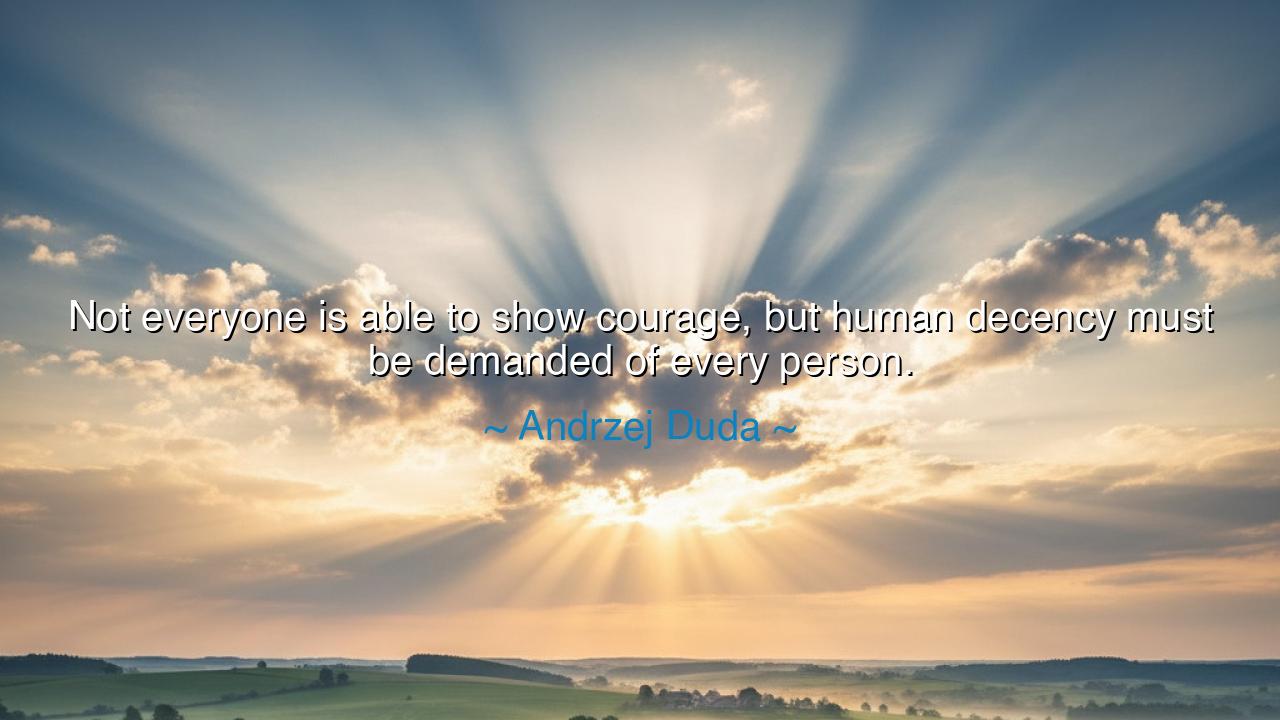
Not everyone is able to show courage, but human decency must be
Not everyone is able to show courage, but human decency must be demanded of every person.






The statesman Andrzej Duda, speaking with the solemn wisdom of one who knows both the fragility and the strength of the human spirit, once declared: “Not everyone is able to show courage, but human decency must be demanded of every person.” In this statement lies a truth both humble and mighty—a recognition that while courage may be the gift of the few, decency is the duty of all. For in the great fabric of civilization, not all are called to be heroes, but each is called to be human—to uphold dignity, to act with kindness, and to refrain from cruelty even when the world is harsh.
To understand this wisdom, we must first know the difference between courage and decency. Courage is the flame that burns brightly in moments of peril—it is the heart that stands unbroken before danger or tyranny. Not every soul, as Duda reminds us, possesses that fire, for fear is a shadow that touches every mortal being. But decency—that quiet, steadfast virtue—is not a matter of heroism but of choice. It is the simple yet sacred act of treating others with fairness, compassion, and respect. It is the foundation upon which courage itself is built, and without it, even the bravest deeds lose their meaning.
This truth has echoed through the ages. The annals of history are filled with tales of those who could not summon courage, yet still clung to decency, and through it preserved the light of humanity. During the darkness of war, in times when cruelty ruled and fear silenced nations, there were ordinary souls who refused to betray their neighbors, who shared bread with the hungry, who spoke a kind word when silence might have been safer. They were not warriors, not leaders, but people of conscience—and in their small acts of goodness, they upheld the dignity of all mankind.
Consider the example of Oskar Schindler, a man who lived during one of humanity’s darkest chapters. He was no saint in his beginnings—an industrialist, ambitious and indulgent—but when faced with the horror of injustice, his decency awakened. Though he could not overthrow tyranny, he chose to act with humanity. At great personal risk, he saved over a thousand lives during the Holocaust. His courage grew from compassion, but it was his decency—his refusal to treat others as less than human—that made his deeds immortal. In his story, we see Duda’s truth: that heroism is rare, but human decency must never be optional.
For a society cannot survive on courage alone. If courage is the sword that defends the good, decency is the soil in which the good grows. It is what allows communities to heal after suffering, what enables forgiveness after conflict, what keeps love alive amidst bitterness. When people lose the sense of shared decency, they lose the very essence of civilization. Without it, laws become hollow, and progress turns to dust. The ancients knew this well; they built their codes of honor, their creeds of justice, upon the idea that though few may be heroes, all must be just, all must be kind, all must be humane.
And yet, to demand decency is no easy task. It requires that each person look inward and confront their own indifference, their own pride. For indecency often begins not in malice, but in neglect—the failure to see another’s pain, the refusal to act when wrong is done. This is why Duda’s words carry both compassion and command: we cannot expect every heart to be fearless, but we must expect every soul to be fair. It is not enough to admire the courage of others; we must practice decency ourselves in the smallest of daily choices—how we speak, how we listen, how we treat even those who cannot return our kindness.
Thus, my children, remember this: Courage is the light that shines in storms, but decency is the steady flame that warms the world. Be decent, even when you cannot be brave. Be kind, even when you are afraid. Stand for truth when you can, but at least, never add to cruelty, never be the cause of another’s suffering. Let decency be your constant companion, your quiet form of courage.
And if ever you wonder what it means to live rightly, remember the teaching of Andrzej Duda: that though not all can be heroes, all can be good. The strength of humanity lies not only in the daring few who change history, but in the countless hearts who, day after day, choose compassion over indifference, and dignity over hate. For when human decency is demanded—and lived—the world itself begins to heal, and even the timid find themselves brave.






AAdministratorAdministrator
Welcome, honored guests. Please leave a comment, we will respond soon